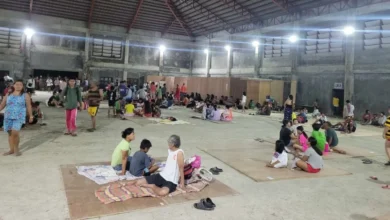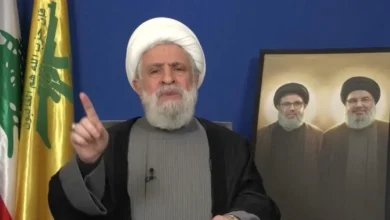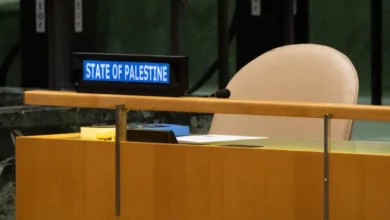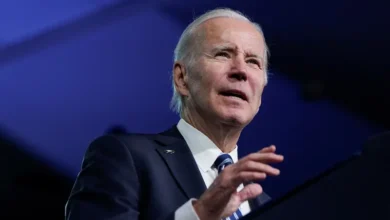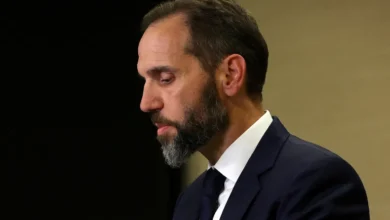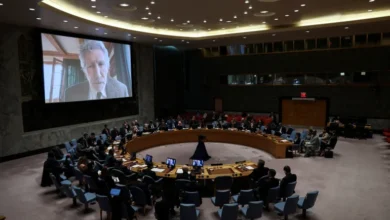Will Yunus-led interim government bring Bangladesh out of its ‘dark era’?

Maliha Namlah says she had been holding her breath since Monday when student-led protests in Bangladesh forced longtime Prime Minister Sheikh Hasina to resign and flee the country after weeks of deadly unrest in which more than 300 people were killed.
Namlah, 19, was one of the coordinators of the student movement at Jahangirnagar University on the outskirts of the capital, Dhaka. As soon as Hasina’s government fell, her only worry was whether it would be replaced with another military rule in a country that has seen several coups since its independence from Pakistan in 1971.
But the current army chief, General Waker-uz-Zaman, has been hailed for taking charge of a country in turmoil and announcing the formation of an interim government as soon as Hasina fled.
“We didn’t fight and shed blood for a military government. We wanted a civilian government that will bring genuine reforms,” Namlah told Al Jazeera on Friday.
“And we are relieved to see that that happened quickly.”
Three days after Hasina quit, Muhammad Yunus, the South Asian country’s only Nobel laureate, was sworn in on Thursday night as the “chief adviser” of a caretaker government tasked to bring peace and democracy, both of which Hasina’s critics said were undermined during her 15 years of “autocratic” rule.
The chief adviser of the caretaker government holds the rank of the prime minister while members of the advisory council are granted the status of ministers.
But the current army chief, General Waker-uz-Zaman, has been hailed for taking charge of a country in turmoil and announcing the formation of an interim government as soon as Hasina fled.
“We didn’t fight and shed blood for a military government. We wanted a civilian government that will bring genuine reforms,” Namlah told Al Jazeera on Friday.
“And we are relieved to see that that happened quickly.”
Three days after Hasina quit, Muhammad Yunus, the South Asian country’s only Nobel laureate, was sworn in on Thursday night as the “chief adviser” of a caretaker government tasked to bring peace and democracy, both of which Hasina’s critics said were undermined during her 15 years of “autocratic” rule.
The chief adviser of the caretaker government holds the rank of the prime minister while members of the advisory council are granted the status of ministers.
As the new administration takes over in Dhaka, many are wondering whether it will be able to take the country of 170 million people out of what one of the members of the new government called a “dark era”.
“The army chief had promised an interim government, but until it was officially established, uncertainty remained due to widespread speculation,” Saifullah Sajib, an employee at a travel agency in Dhaka, told Al Jazeera as he watched a live telecast of Yunus and his 16-member cabinet take their oaths at the presidential palace.
Why was Yunus picked?
The protests in Bangladesh that began last month were led mainly by tens of thousands of university students opposed to a quota system for government jobs that they alleged favoured those close to Hasina’s Awami League party.
The primarily peaceful demonstrators were attacked by both the security forces as well as supporters of Hasina’s party, resulting in nearly 300 deaths and transforming the protests into a larger call for Hasina to quit.
Hours after she resigned and fled to neighbouring India in a military aircraft, the Students Against Discrimination, an umbrella group of student movements that led the protests, proposed 84-year-old Yunus as the head of an interim government.“We must ensure that the benefits of this freedom extend to every citizen. Otherwise, it would be meaningless. Therefore, we commit to bringing freedom to every home,” he said, adding that those who committed wrongdoing during Hasina’s tenure “will be held accountable”.Analysts said one of Yunus’s main challenges will be to ensure law and order after days of chaos that saw attacks on the houses of Awami League politicians, sporadic attacks on temples and homes of minority Hindus who were considered close to the ousted Hasina, and a general absence of policing, manifested by students this week managing traffic on the busy streets of Dhaka.
Acknowledging the disorder, Asif Nazrul, professor of law at Dhaka University and member of Yunus’s interim government tasked with running the Ministry of Law and Justice, said it is grappling with multiple challenges due to the unprecedented situation in the country.
“Under [Hasina’s] autocratic rule, it was a dark era, and the people’s profound anger against the regime led to this eruption. However, we can no longer support such outbursts as they have exceeded acceptable limits,” he said.
Who else is in the government?
The interim government is a mix of both experience and youth and includes rights activists, professors, lawyers, former government officials and other prominent members of Bangladesh’s civil society.
But it is the surprise inclusion of two 26-year-old student leaders who spearheaded the recent movement against Hasina that is likely to be a talking point in the coming days.
Nahid Islam, a student of sociology at Dhaka University, has been given the telecommunications portfolio while Asif Mahmud, a student of linguistics at the same university, will look after sports.
Mahmud said he was ready for the challenges ahead. “The state institutions were devastated under [Hasina’s] fascist regime. Our goal is to eradicate fascism by reforming these institutions,” he said.
Former army officer M Sakhawat Hossain has been given the Ministry of Home Affairs. He used to be close to Hasina’s Awami League but supported the student protests against her government.
The Ministry of Finance has been given to Saleh Uddin Ahmed, who governed the central bank during the 2001-2006 rule of the opposition Bangladeshi Nationalist Party (BNP). Former diplomat and columnist Touhid Hossain will look after foreign affairs.
Other notable figures in the new government are climate change minister Syeda Rizwana Hasan, a winner of the Ramon Magsaysay Award – often referred to as Asia’s Nobel Prize – for her environmental work; rights activist Adilur Rahman Khan, who will handle industries; electoral reforms activist Sharmeen Murshid, charged with the Ministry of Social Welfare; and women’s rights activist and advocate for biodiversity-based ecological agriculture Farida Akhter, who will run the Ministry of Fisheries and Livestock.
The other members of the cabinet are former Attorney General Hasan Ariff (local government affairs), Yunus’s longtime associate Nurjahan Begum (health) and Muslim leader and academic Khalid Hossain (religious matters).
The portfolios of the remaining three members – psychiatrist Bidhan Ranjan Roy from the minority Hindu community, former diplomat Supradip Chakma from the Indigenous Chakma community, based in the Chittagong Hill Tracts, and independence fighter Faruk-e-Azam – have not been declared.
Michael Kugelman, deputy director of the Asia Program and senior associate for South Asia at the Woodrow Wilson International Center in the United States, told Al Jazeera that “on paper”, the interim government with its “wide array of leaders from all walks of life looks remarkably diverse”.
“But how everything fits together and whether a consensus is possible is unclear. This is where Yunus’s leadership will be essential,” he said.

